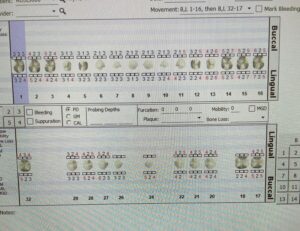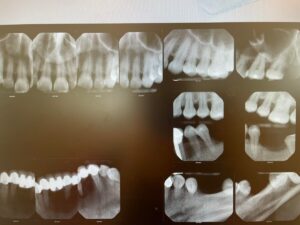Demographics
Patient is a 43 years old, Hispanic female. Heavy/Stage II/Grade B.
Assessment
Purpose of the visit was oral health examination and teeth cleaning. Patient is not on any medications and has a Penicillin allergy. Her blood pressure was taken twice, First, her blood pressure was 121/93, and on the second time, it was 119/96. Her pulse remained at 80 for both takes and she is also ASA: 2 due to hypertension(high blood pressure) and Penicillin allergy. Patients at home self care is as follows, manual toothbrush two times a day, uses whitening Sensodyne dentifrice, does not floss, uses Listerine once a day, and does not use a tongue cleaner. Based on the Vitals patient presents hypertensive blood pressure since both of the times her blood pressure was high.
Oral Pathology (Extra and intra oral findings)
EO Findings: Patient had crepitation left side of TMJ. IO Findings: Bilateral linea alba and slightly coated tongue.
Dentition
Patient had Class of occlusion II, bilateral. Patient presented an open bite. Attrition was shown on mandibular and maxillary arch canine to canine.
Periodontal Findings
Clinical findings showed generalized, moderate bleeding upon probing. The average of probing depth was 3-5mm, with localized 5-7mm. Overall, patient had generalized inflamed gingiva, with localized erythematous gingiva present with bulbous, leathery, and had smooth/shiny texture. shape of gingiva fits snugly around teeth, consistency is firm with stippling texture.
Radiographic Findings
Generalized, horizontal, and vertical bone loss with areas of suspicious caries and possible endo treatment.
Hypertension Explained
Hypertension, AKA High Blood Pressure, is when your blood pressure, which is the force of blood flowing through your blood vessels, is consistently too high. There are two numbers that display when reading blood pressure, one is Systolic (top number) and the second one is called Diastolic (bottom number). The systolic number should be less than 120 and Diastolic should be less than 80 to be considered “normal.” Hypertension can effect patients getting dental treatment because of a stressful environment, like when a patient is having more serious dental work done, it can cause an elevation in blood pressure which can result in acute complications such as cardiac arrest. In this case, the patient was hypertensive and unaware of her condition.
Treatment Management
Since hypertension usually doesn’t create problems during dental treatment, it was recommended to still maintain brushing twice a day with electric toothbrush with gum detoxify dentifrice rather than sensodyne, to help with any inflammation, start using interdental aid twice a day to help clean bacteria, use Listerine Antiseptic oral rinse, and to also speak with her doctor about her blood pressure to see how she can manage it. It was also recommended to inform any other dental professionals she sees about her blood pressure so they’re aware.




